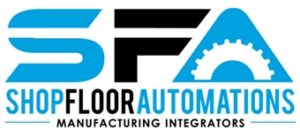How Lean Manufacturing Can Improve the Efficiency of Your Manufacturing Process

Manufacturing is typically a very competitive field. Competitors are looking for any means necessary to cut costs or scale up production in order to increase profits. One strategy that companies are using to improve the operations at their shop is to shift towards lean manufacturing.
What is lean manufacturing?
The theory behind lean manufacturing is pretty straight forward. You simply want to eliminate waste from the manufacturing process. The trick is identifying waste and learning how to eliminate it. In definition, waste is any activity that adds no value from the customers perspective. One example of this is keeping inventory levels as low as possible. Customers don’t actually care how much excess inventory you have, just that you’re able to deliver their specified orders on time.
With studies showing that 60% of production activities in a typical manufacturing process are waste, it means there are plenty of opportunity areas. You just need to be able to identify them.
What are the benefits of lean manufacturing?
The reason many manufacturers are taking advantage of lean manufacturing is that there are many benefits. Lean manufacturing can improve overall efficiency, increase productivity and reduce waste. More specifically, the benefits of lean manufacturing are:
- Increased product quality: With increased efficiency, more employees and funds are freed up for quality control and innovation measures.
- Sustainability: With less waste and better adaptability, lean manufacturing facilities are primed to thrive in an unpredictable future.
- Employee Satisfaction: Employees no longer have a workday packed with unnecessary work, which boosts morale and satisfaction.
- Faster Lead Times: Streamlined manufacturing processes means that you can respond more quickly to demand and other shifting market variables.
- Higher Profits: If done correctly, with less waste, better quality products, and more productivity, those using lean manufacturing are likely to become more profitable.
What are some examples of waste that can be eliminated?
Removing waste is essential for lean manufacturing, but what does that actually mean? A few examples of removing waste are:
- Matching production to the rate of customer demand
- Create processes with continual flow instead of stoppage
- Avoid continually changing job priorities or roles
- Matching manufacturing specifications to customer requirements to avoid over-processing
- Bringing in raw materials only as needed
- Design quality control processes to detect and correct abnormalities right away
- Going paperless
How can Shop Floor Automations help me shift to lean manufacturing?
If you are interested in shifting towards lean manufacturing, it is important to have a knowledgeable partner like Shop Floor Automations on your side. While much of lean manufacturing centers on reducing waste, improving productivity is another important aspect. This can be done by looking at the human potential of your team. Your employees are the ones running the equipment to keep your operation running smoothly and it’s important to give them the right tools to do their job well. A machine monitoring system like Scytec DataXchange or Predator Machine Data Collection Software is great for giving your employees the information they need to maximize shop floor efficiencies. Contact Shop Floor Automatics at (619) 461-4000 to learn more!
